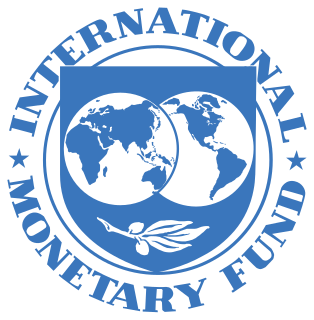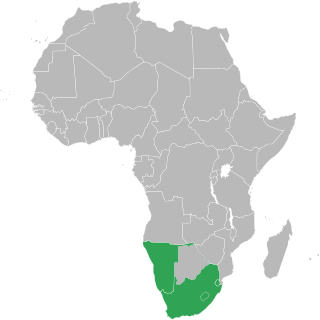Related Research Articles

The International Monetary Fund (IMF) is an agency of the United Nations, and an international financial institution, headquartered in Washington, D.C., consisting of 190 countries. Its stated mission is "working to foster global monetary cooperation, secure financial stability, facilitate international trade, promote high employment and sustainable economic growth, and reduce poverty around the world." Formed in 1944, started on 27 December 1945, at the Bretton Woods Conference primarily by the ideas of Harry Dexter White and John Maynard Keynes, it came into formal existence in 1945 with 29 member countries and the goal of reconstructing the international monetary system. It now plays a central role in the management of balance of payments difficulties and international financial crises. Countries contribute funds to a pool through a quota system from which countries experiencing balance of payments problems can borrow money. As of 2016, the fund had XDR 477 billion.

Eswatini, officially the Kingdom of Eswatini and formerly named Swaziland, is a landlocked country in Southern Africa. It is bordered by Mozambique to its northeast and South Africa to its north, west, south, and southeast. At no more than 200 kilometres (120 mi) north to south and 130 kilometres (81 mi) east to west, Eswatini is one of the smallest countries in Africa; despite this, its climate and topography are diverse, ranging from a cool and mountainous highveld to a hot and dry lowveld.
Special drawing rights (SDRs) are supplementary foreign exchange reserve assets defined and maintained by the International Monetary Fund (IMF). SDRs are units of account for the IMF, and not a currency per se. They represent a claim to currency held by IMF member countries for which they may be exchanged. SDRs were created in 1969 to supplement a shortfall of preferred foreign exchange reserve assets, namely gold and U.S. dollars. The ISO 4217 currency code for special drawing rights is XDR and the numeric code is 960.
The category of newly industrialized country (NIC), newly industrialized economy (NIE) or middle income country is a socioeconomic classification applied to several countries around the world by political scientists and economists. They represent a subset of developing countries whose economic growth is much higher than other developing countries; and where the social consequences of industrialization, such as urbanization, are reorganizing society.

The Cooperation Council for the Arab States of the Gulf, also known as the Gulf Cooperation Council, is a regional, intergovernmental, political, and economic union comprising Bahrain, Kuwait, Oman, Qatar, Saudi Arabia, and the United Arab Emirates. The council's main headquarters is located in Riyadh, Saudi Arabia. The Charter of the GCC was signed on 25 May 1981, formally establishing the institution.

The G20 or Group of Twenty is an intergovernmental forum comprising 19 countries and the European Union (EU). It works to address major issues related to the global economy, such as international financial stability, climate change mitigation, and sustainable development.
Manzini is a city in Eswatini (Swaziland), which is also the capital of Eswatini's Manzini Region. The city is the country's largest urban center ahead of Mbabane, with a population of 110,000 (2008). It is known as "The Hub" of Eswatini and lies on the MR3 road. Eswatini's primary industrial site at Matsapha lies near the town's western border.

The Common Monetary Area (CMA) links South Africa, Namibia, Lesotho and Eswatini into a monetary union. It is allied to the Southern African Customs Union (SACU).
Foreign relations of Kosovo are accomplished by efforts of the Ministry of Foreign Affairs of Kosovo. Kosovo operates 33 embassies abroad and is host to 22 embassies in Pristina. Kosovo has membership in several international organisations.
Education in Eswatini includes pre-school, primary, secondary and high schools, for general education and training (GET), and universities and colleges at tertiary level.
Banking in Bhutan, a small country in East Asia, is an industry that has grown slowly as the country has pursued modernization. The country has a vibrant informal culture of finance which only weakly integrates formal financial services.
HIV/AIDS in Eswatini was first reported in 1986 but has since reached epidemic proportions. As of 2016, Eswatini had the highest prevalence of HIV among adults aged 15 to 49 in the world (27.2%).

Government of the Syrian Arab Republic is the union government created by the constitution of Syria where by the president is the head of state and the prime minister is the head of government. Executive power is exercised by the government. Syria has a legislative council with 250 members. The country has been in a civil war since 2011 against various domestic and foreign forces that oppose both the Syrian government and each other, in varying combinations. The seat of the government is located in Damascus, Syria.
The Financial Stability Board (FSB) is an international body that monitors and makes recommendations about the global financial system. It was established after the G20 London summit in April 2009 as a successor to the Financial Stability Forum (FSF). The Board includes all G20 major economies, FSF members, and the European Commission. Hosted and funded by the Bank for International Settlements, the board is based in Basel, Switzerland, and is established as a not-for-profit association under Swiss law.

Cannabis in Palau is illegal, but reports indicate the drug is widely produced and consumed on the island nation. Palau is a former Trust Territory of the Pacific Islands of the United States which gained independence in 1994, and has a population under 20,000.
In 1945, China cofounded the International Monetary Fund (IMF) with 34 other nations. In April 1980, the People's Republic of China, established a formal relationship with the IMF. The Chinese-IMF relationship mainly operates around affairs associated with IMF governance and the IMF Special Drawing Rights (SDR).
The Health in Eswatini is poor and four years into the United Nations sustainable development goals, Eswatini seems unlikely to achieve goal on health. As a result of 63% poverty prevalence, 27% HIV prevalence, and poor health systems, maternal mortality rate is a high 389/100,000 live births, and under 5 mortality rate is 70.4/1000 live births resulting in a life expectancy that remains amongst the lowest in the world. Despite significant international aid, the government fails to adequately fund the health sector. Nurses are now and again engaged in demonstrations over poor working conditions, drug stock outs, all of which impairs quality health delivery. Despite tuberculosis and AIDS being major causes of death, diabetes and other non-communicable diseases are on the rise. Primary health care is relatively free in Eswatini save for its poor quality to meet the needs of the people. Road traffic accidents have increased over the years and they form a significant share of deaths in the country.
References
- ↑ Dept, International Monetary Fund African (2014-07-23). Kingdom of Swaziland: 2014 Article IV Consultation-Staff Report; and Press Release. International Monetary Fund. ISBN 978-1-4843-4594-8.
- ↑ "The Swazi Observer". Archived from the original on 2011-07-16. Retrieved 2010-04-10.